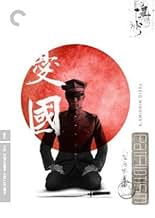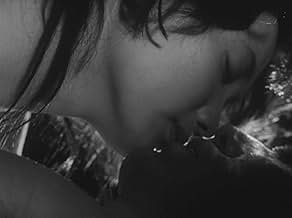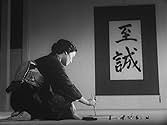IMDb RATING
7.4/10
2.2K
YOUR RATING
A Noh dramatization of the suicides of Lt. Shinji Takeyama and his wife Reiko. After participating in a failed 1936 coup and being ordered to execute his friends, he bids his wife an intimat... Read allA Noh dramatization of the suicides of Lt. Shinji Takeyama and his wife Reiko. After participating in a failed 1936 coup and being ordered to execute his friends, he bids his wife an intimate farewell and commits harakiri.A Noh dramatization of the suicides of Lt. Shinji Takeyama and his wife Reiko. After participating in a failed 1936 coup and being ordered to execute his friends, he bids his wife an intimate farewell and commits harakiri.
Featured reviews
This film prophetically (Yukio Mishima committed suicide in 1970) and dramatically portrays the ritual suicide of a dishonored Japanese patriot. It's an extraordinary short watch but may be a bit intense for those who dislike graphic gore. I doubt I will ever forget the experience of having seen this.
Infrequently, the esteemed "Criterion Collection" DVD label puts out a Short Subject as a stand-alone release (as opposed to comprehensive collections, such as the recently-referenced Jean Painlevé one and another devoted to the works of Stan Brakhage), albeit reasonably priced – for them – at a much lower-than-usual tier. A couple of these were notable films worthy of such a pedigree – Alain Resnais' fascinating (if necessarily harrowing) depiction of concentration-camp atrocities NIGHT AND FOG (1955) and Albert Lamorisse's charming (and Oscar-winning) THE RED BALLOON (1956; actually issued as a dual-movie edition with the same director's WHITE MANE {1953}, which I own but have yet to check out).
This one, then, was an odd choice for such a distinction: not only is it not that well-known, even to more-than-casual film-buffs (I, for one, was completely unaware of it!) but, since it was a half-hour effort written, directed by and starring celebrated Japanese author Mishima, ideally it ought to have served as a great bonus feature on the same company's digital edition of Paul Schrader's semi-biopic MISHIMA: A LIFE IN FOUR CHAPTERS (1985; which, again, I do have a copy of but remains as-yet unwatched) – rather than ask potential buyers to fork out extra money for an additional disc! For the record, I had previously watched Kon Ichikawa's masterful rendition of Mishima's CONFLAGRATION (1958), as well as seen the author himself assume the lead role in Yasuzo Masumura's gangster thriller AFRAID TO DIE (1960); besides, I own other two adaptations of his work – THE MUSIC (1972), also by Masumura, and the Americanization of THE SAILOR WHO FELL FROM GRACE WITH THE SEA (1976).
Anyway, what we have here is a Silent movie (itself divided into 5 chapters) – the narrative's progression described exclusively via the text (included on the DVD in either the original Japanese with accompanying English subtitles, as I opted to acquire it myself, or a ready-made English translation) on a scroll held in front of the camera! – involving the aftermath of a failed coup d'etat. A military officer (Mishima) is asked to execute the men responsible but, as they are his friends and colleagues, he becomes conflicted by this grave assignment (hence, the title is ironic): his understanding wife knows what this entails – he shirks his duty by committing ritual suicide on the eve of the appointed task (but not before having spent the night with his spouse), to be followed by the woman herself (who subsequently has nothing to live for)!
The double "seppuku" is quite graphically handled, with a generous display of blood and entrails 'tarnishing' the otherwise impeccable and spare monochromatic setting! The plot may bear similarities to the legendary (and oft-filmed, including an ill-advised brand-new version) saga of "The 47 Ronin" but it had a chilling duplication in reality four years later when Mishima, himself a soldier with radical political beliefs, attempted an overthrow of authority and 'forced' (though some argue it was planned as such all along!) to take his own life when his 'noble' intentions left most of the witnessing 'brothers-in-arms' nonplussed and openly mocking! Talk of life imitating art!
This one, then, was an odd choice for such a distinction: not only is it not that well-known, even to more-than-casual film-buffs (I, for one, was completely unaware of it!) but, since it was a half-hour effort written, directed by and starring celebrated Japanese author Mishima, ideally it ought to have served as a great bonus feature on the same company's digital edition of Paul Schrader's semi-biopic MISHIMA: A LIFE IN FOUR CHAPTERS (1985; which, again, I do have a copy of but remains as-yet unwatched) – rather than ask potential buyers to fork out extra money for an additional disc! For the record, I had previously watched Kon Ichikawa's masterful rendition of Mishima's CONFLAGRATION (1958), as well as seen the author himself assume the lead role in Yasuzo Masumura's gangster thriller AFRAID TO DIE (1960); besides, I own other two adaptations of his work – THE MUSIC (1972), also by Masumura, and the Americanization of THE SAILOR WHO FELL FROM GRACE WITH THE SEA (1976).
Anyway, what we have here is a Silent movie (itself divided into 5 chapters) – the narrative's progression described exclusively via the text (included on the DVD in either the original Japanese with accompanying English subtitles, as I opted to acquire it myself, or a ready-made English translation) on a scroll held in front of the camera! – involving the aftermath of a failed coup d'etat. A military officer (Mishima) is asked to execute the men responsible but, as they are his friends and colleagues, he becomes conflicted by this grave assignment (hence, the title is ironic): his understanding wife knows what this entails – he shirks his duty by committing ritual suicide on the eve of the appointed task (but not before having spent the night with his spouse), to be followed by the woman herself (who subsequently has nothing to live for)!
The double "seppuku" is quite graphically handled, with a generous display of blood and entrails 'tarnishing' the otherwise impeccable and spare monochromatic setting! The plot may bear similarities to the legendary (and oft-filmed, including an ill-advised brand-new version) saga of "The 47 Ronin" but it had a chilling duplication in reality four years later when Mishima, himself a soldier with radical political beliefs, attempted an overthrow of authority and 'forced' (though some argue it was planned as such all along!) to take his own life when his 'noble' intentions left most of the witnessing 'brothers-in-arms' nonplussed and openly mocking! Talk of life imitating art!
The momentum of the DEI movement has waned, and in some cases, even regressed. The historical bias against homosexuality largely stems from religious and ideological doctrines rather than scientific reasoning, much like how witch hunts and political purges were once justified under the banner of democracy. The modern ethical framework that once constrained such primal instincts is now being challenged again.
Homosexuality, rather than being an anomaly, is one of many natural variations of human sexuality. If the pioneering work of Dr. Magnus Hirschfeld (1868-1935) had not been suppressed by the Nazi regime, scientific recognition of sexual diversity might have progressed more coherently. Instead, prejudice prevailed, delaying a deeper biological understanding of love in its many forms.
Diversity is the phenomenon that can't be circumvented but can be subdued through natural selection in every environmental change. Sometimes it reminds me of Mishima's "Confession of a Mask". His inherent covete to male brawny flesh is elucidated minutely rather passionately, with contrasting his ambivalent but requisite feeling for male to be attracted to chubby cute girl. We can see many works treating sex and death in Mishima's literature. Mishima's writing is strikingly detailed-his protagonist's attraction to the muscular male physique, particularly the famous image of St. Sebastian pierced with arrows, is described with both yearning and shame, reflecting an internal conflict that mirrors broader societal taboos, which apparently implies his ultimate desire was to be crucified to death in "naked". His life was obviously not personal and private, but really publicly exposed and theatrical, a really fragile "exhibitionist". And it was even his intention.
Yukoku (Patriotism), one of Mishima's most distilled expressions of his core themes-sex, death, beauty, and devotion, was strikingly intense work, particularly in the 1966 film adaptation that Mishima himself directed and starred in. Mishima is not writing about loyalty or patriotism-he's transforming the act of death into something sacred, erotic, and theatrical.
In his life, what is diversified for humans was sublimated and condensed. Ordinarily it's too arcane to clarify and classify. Thanks to him, we can feel and assume what it means, what it came from and what it leads to. Not so analytical, but rather instinctively. Begin from small empathy in his description to larger extention of understanding.
Homosexuality, rather than being an anomaly, is one of many natural variations of human sexuality. If the pioneering work of Dr. Magnus Hirschfeld (1868-1935) had not been suppressed by the Nazi regime, scientific recognition of sexual diversity might have progressed more coherently. Instead, prejudice prevailed, delaying a deeper biological understanding of love in its many forms.
Diversity is the phenomenon that can't be circumvented but can be subdued through natural selection in every environmental change. Sometimes it reminds me of Mishima's "Confession of a Mask". His inherent covete to male brawny flesh is elucidated minutely rather passionately, with contrasting his ambivalent but requisite feeling for male to be attracted to chubby cute girl. We can see many works treating sex and death in Mishima's literature. Mishima's writing is strikingly detailed-his protagonist's attraction to the muscular male physique, particularly the famous image of St. Sebastian pierced with arrows, is described with both yearning and shame, reflecting an internal conflict that mirrors broader societal taboos, which apparently implies his ultimate desire was to be crucified to death in "naked". His life was obviously not personal and private, but really publicly exposed and theatrical, a really fragile "exhibitionist". And it was even his intention.
Yukoku (Patriotism), one of Mishima's most distilled expressions of his core themes-sex, death, beauty, and devotion, was strikingly intense work, particularly in the 1966 film adaptation that Mishima himself directed and starred in. Mishima is not writing about loyalty or patriotism-he's transforming the act of death into something sacred, erotic, and theatrical.
In his life, what is diversified for humans was sublimated and condensed. Ordinarily it's too arcane to clarify and classify. Thanks to him, we can feel and assume what it means, what it came from and what it leads to. Not so analytical, but rather instinctively. Begin from small empathy in his description to larger extention of understanding.
Short film, i was suprised by the fact that apart from the music that it was silent. The lighting is beautiful and the film is made with obvious care and passion. The end of the film is in direct contrast to the rest with its very extreme imagry of the seppuku ritual, but altogether this film gets my vote as a very artisitc mood film.... A lot of film makers now should consider the use of that lighting!!!!!!!
make sure to watch the version with the new score by aaron embry. it's much more beautiful as the ambient music adds so much to the film where the older music made it seem dated which was unfortunate because the cinematography was so ahead of it's time.
.
.
Did you know
- TriviaAfter Mishima's death on 25 November 1970, all prints of this film were rumored to have been destroyed by his wife Yoko. However, in August 2005, original film negatives were "discovered" at the late author's residence in Ota Ward, Tokyo. About 40 reels have now been found in what Japanese media refer to as an "airtight tea box". According to Hiroaki Fujii (78), the movie's producer (who at the time apparently urged Yoko to keep the original intact), the recovered elements are in "pristine condition". The film will be released on DVD by Shinchosha early in 2006.
- ConnectionsReferenced in Mishima - une vie en quatre chapitres (1985)
Details
- Release date
- Country of origin
- Language
- Also known as
- Rites d'amour et de mort
- Production companies
- See more company credits at IMDbPro
- Runtime30 minutes
- Color
- Sound mix
- Aspect ratio
- 1.37 : 1
Contribute to this page
Suggest an edit or add missing content



















